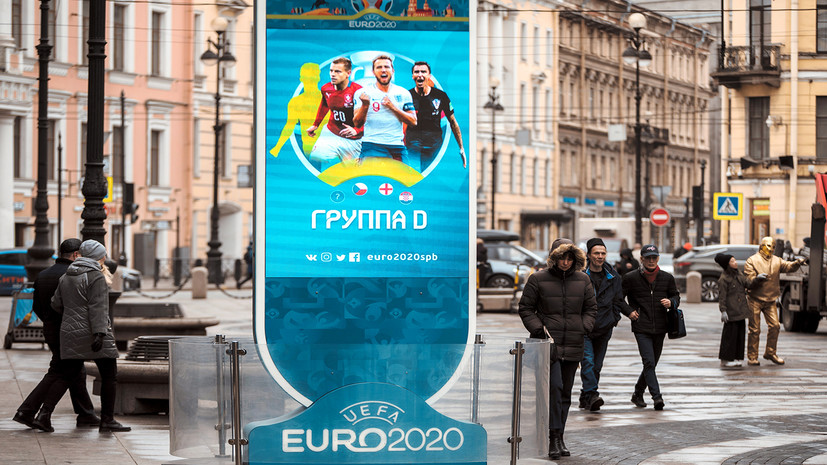The Union of European Football Associations (UEFA) has finally decided on the venues of the European Championship, which will take place this summer.
Bilbao and Dublin were excluded from the host cities, and St. Petersburg received three more group stage games.
In total, Russia will host seven matches of Euro 2020.
These will be games of groups B, in which Stanislav Cherchesov's charges will play, and E, as well as one quarterfinal meeting.
The Gazprom Arena stadium will be the second after Wembley in terms of the number of games entrusted to it.
According to Alexei Sorokin, Director General of the Organizing Committee of the Russian part of Euro 2020, St. Petersburg will be ready to host all matches, with about a month and a half left before the first.
“For us, this is undoubtedly an additional burden, but it is also evidence of trust in Russia as a match organizer.
The Russian Football Union is a reliable partner of UEFA and is always ready to help if a city finds itself in a difficult situation.
The pandemic is not developing uniformly, and it has happened in some cities.
They have worked well all these years, but this is not their fault.
We are convinced that we will cope, "Sorokin told RT.
He also noted that the Gazprom-Arena lawn will withstand the increased load, and the city authorities will support the organizers of Euro 2020.
“The stadium is beautiful, the pitch is in good condition, with some synthetic elements. Seven matches is quite a feasible load. We have determined the hotels of the teams. It is quite possible that we will talk with the city about the allocation of additional capacities. In general, St. Petersburg will cope with the additional influx of teams, delegations and fans. We will conduct a dialogue with the city on how best to organize everything. We are sure that he will also be ready to lend a shoulder to our Euro partners and will approach the task as constructively as possible, "Sorokin added.
The final decision was made at the UEFA Executive Committee, held on Friday, although talk about the likely postponement of matches began to go even earlier. For the organizers of Euro 2020, it was fundamentally important that, in the context of the ongoing coronavirus pandemic, all matches must be held in the presence of spectators. The minimum stadium capacity threshold was set at 25%.
On April 9, eight out of a dozen cities confirmed that they are ready to fulfill this condition. Most of them guaranteed that they would admit at least 25% of the spectators to the stands, and with a favorable coincidence, they would increase this threshold as well. St. Petersburg and Baku have announced that they will accept at least 50% of the fans, although foreigners will not be allowed into Azerbaijan except those whose teams will play in a particular match. In Budapest, they even stated that they are ready to completely fill the Puskas Arena with a capacity of 67,215 seats, but at the same time, each visitor will have to observe strict security measures.
UEFA still had questions for Bilbao, Dublin, Rome and Munich.
They were given two weeks to decide on the admission of fans to the stands.
In the Italian capital, later, they nevertheless agreed to accept 25% of the spectators from the maximum occupancy of the Stadio Olimpico, and Rome was given the green light.
The fate of matches in other cities remained uncertain until the last moment.
Even before the meeting of the UEFA Executive Committee, it became known that Euro 2020 would not take place in Bilbao.
This was announced by the city council of the capital of the Basque Country.
According to him, UEFA has unilaterally terminated the agreement on the organization of games at the San Mamés stadium, where three matches of Group E and one meeting of the 1/8 finals are to be held.
The city authorities did not agree with this decision and immediately announced that they would sue UEFA and demand compensation in the amount of € 1.5 million.
However, the Spanish national team will not be left without the support of native fans.
The matches from Bilbao were moved to Sevilla to the Olimpiyskiy stadium, where the local authorities nevertheless agreed to fill the 60,000-seat arena by at least 30%.
At the new stadium, the Spaniards will host Sweden, Poland and Slovakia.
There is a chance that the Russian national team will also play there, if it manages to make it to the playoffs from the first place in its group.
All other matches of Group E instead of Dublin went to St. Petersburg.
The stadium "Gazprom-Arena" will receive fans on 14, 18 and 23 June.
But at the same time, another meeting of the 1/8 finals, which was supposed to take place in Ireland, was not transferred to Russia.
The Group D winner and the F runner-up will play in London at Wembley.
Previously, journalists assumed that all matches from Dublin would be moved to England.
However, this could not have happened because of the proximity of the two countries, but allegedly in connection with the recent scandal with the European Super League.
According to The Telegraph, the postponement of the Euro 2020 games could be a kind of gratitude from UEFA for the fact that English clubs refused to support the new project.
But this information was not confirmed.
As for Munich, already during the meeting of the executive committee it became known that the local authorities announced their readiness to allow 14.5 thousand fans to the Allianz Arena.
This amounts to slightly less than 20% of the maximum occupancy rate of the stadium.
UEFA met these guarantees, and the city was confirmed the right to host all four matches.

